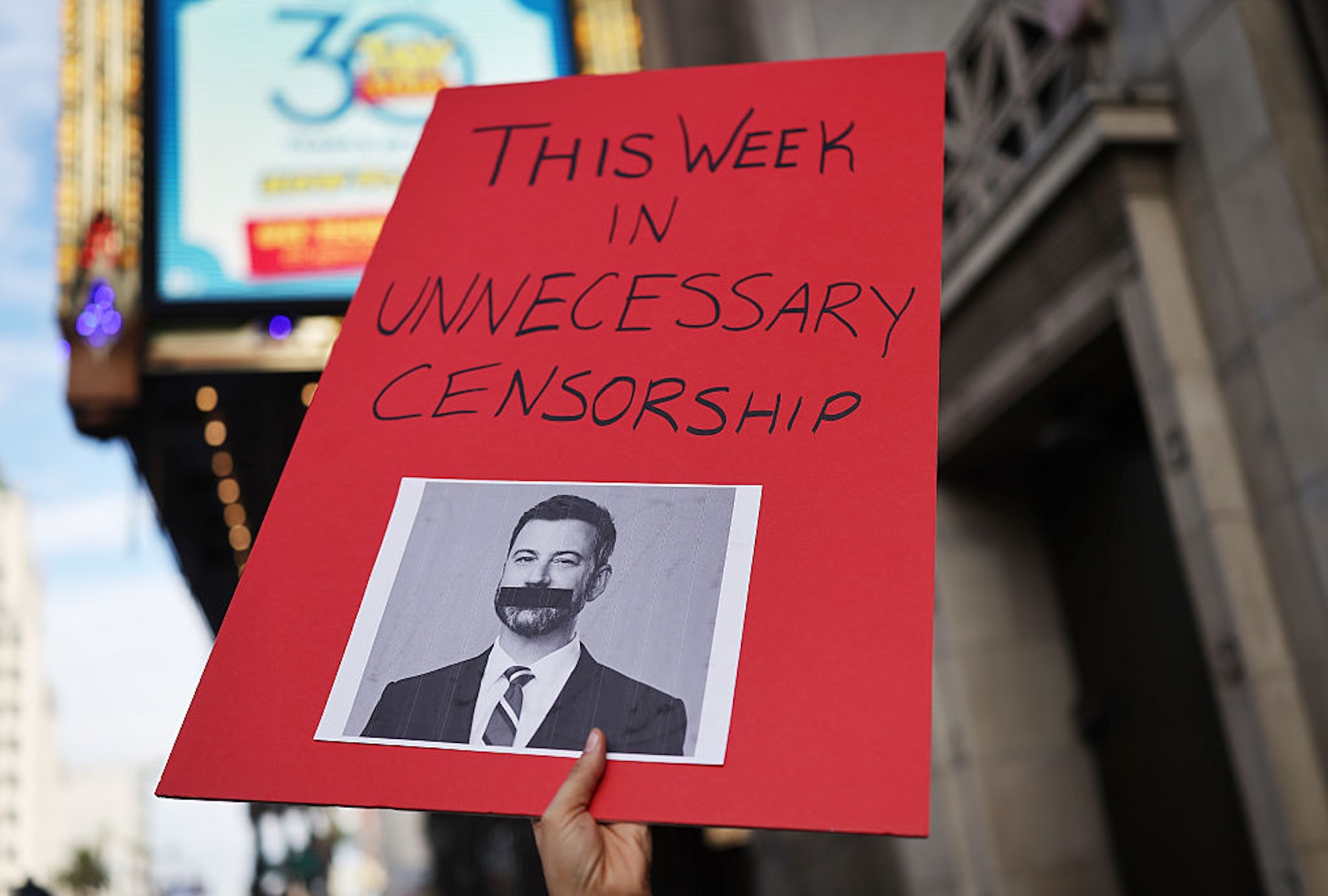As corporate media accelerate their censorship of comedians and journalists, we must realize that we got to this dire situation because of old-fashioned, bipartisan corruption in Washington, D.C. The problem didn’t begin with President Donald Trump. It began long ago, especially in the 1980s and 1990s, when presidents of both parties and Congress decided to put the nation’s media system in the hands of a small number of ever-larger corporations.
Those corporations were big political donors to both parties. Enormous mergers were approved. Antitrust laws were ignored. Federal Communications Commission rules were changed, and caps on mega-ownership were relaxed or eliminated.
There was nothing natural or inevitable about the process of conglomeration. It was sheer corruption — and Trumpian censorship is now the result.
Today, a handful of amoral conglomerates control our information and media system. They care a lot about profit-maximization and very little about free expression and the right to dissent, especially when that expression and dissent interferes with their profits. There was nothing natural or inevitable about the process of conglomeration. It was sheer corruption — and Trumpian censorship is now the result.
This week’s “indefinite” suspension of comedian and Trump critic Jimmy Kimmel by Disney and ABC over remarks about how the right-wing has exploited Charlie Kirk’s murder might seem abrupt. It wasn’t. The action came after an unprecedented threat from FCC Chairman Brendan Carr to go after ABC stations and, perhaps more importantly, it came at the impetus of two powerful companies that had blossomed over the years thanks to political decisions made in Washington. Nexstar Media and Sinclair Broadcast Group each own or operate roughly 200 TV stations across the country, including many ABC affiliates, and they acted before Disney by saying they’d be removing Kimmel’s program from their ABC stations.
The role these two companies played in Kimmel’s suspension is why President Bill Clinton is so important to the story. Working hand-in-hand with Republican House Speaker Newt Gingrich, Clinton pushed into law the 1996 Telecommunications Act — a major, corrupt piece of legislation largely written by corporate lobbyists and barely debated in Congress. (With little media coverage of this corporate-friendly bill, a consumer group approached CNN to try to buy ad time to warn the public, but CNN refused.)
Prior to the law, a company could own only 12 TV stations nationwide — not 200. Besides helping today’s industry giants, Nexstar and Sinclair, the law helped Rupert Murdoch grow his own media company. A conservative Texas-based company, Clear Channel, owned about 50 radio stations before the law — and quickly grew to more than 1,000 after the caps were loosened.
Sinclair is as Trumpian as any media company around. In 2018, the corporation ordered its local TV anchors across the country to read the same pro-Trump script about “one-sided news ” and “fake stories.” The company had intervened in the 2004 presidential election in favor of President George W. Bush by running a “documentary” bashing Massachusetts Sen. John Kerry, the Democratic nominee. On Wednesday, Sinclair demanded that Kimmel apologize to Kirk’s family and donate to Kirk’s political organization.
Want more sharp takes on politics? Sign up for our free newsletter, Standing Room Only, written by Amanda Marcotte, now also a weekly show on YouTube or wherever you get your podcasts.
Nexstar currently needs approval from Trump’s FCC to acquire the media company Tegna in a $6 billion deal that would create what would be, by far, the country’s largest TV company. As Washington Post television critic Lili Loofbourow explained, the merged Nexstar-Tegna corporation would reach 80% of all U.S. households, way beyond the current FCC limit of 39%: “So Nexstar doesn’t just need the FCC’s approval; it also needs the FCC to change that rule or the deal can’t go through.”
This comes on the heels of what another media conglomerate, Paramount, did to secure FCC approval of a merger with Skydance:It tried to muzzle the most profitable TV news show in history, CBS “60 Minutes,” then paid Trump a thinly-disguised $16 million bribe to settle a totally frivolous lawsuit against the program and finally announced the cancellation of Trump-critic Stephen Colbert’s late-night show. The program is set to end in May — if it lasts that long.
Like Paramount, Disney made its own bribe-like payment of $15 million to Trump in December in an attempt to curry favor and settle a frivolous defamation lawsuit against ABC News that Disney could not have lost in court. (The conglomerate now has its own merger deal in need of federal approval, which goes a long way toward explaining its actions against Kimmel.)
We need your help to stay independent
When settlement negotiations between Paramount/CBS and Trump stalled, even after the executive producer of “60 Minutes” and the head of CBS News had resigned, it seemed clear that Team Trump wanted a bigger head on the platter. That’s when I started saying that Colbert may be in jeopardy.
In July, after Paramount announced Colbert’s termination, I appeared on “Democracy Now!” and host Amy Goodman ended the program by asking me for “another prediction” since I’d been right about Colbert.
“Yeah, I’m sad that I believe that Jon Stewart’s in trouble,” I said. “And, you know, Jimmy Kimmel, his employer is Disney. He could be in trouble. You learn more from a 10-minute monologue from these comedians than you do from a month of watching the news on those channels.”
TV’s comedic voices have helped many of us survive psychologically amid the craziness of the Trump era. But now their own existence is uncertain in the hands of media conglomerates intent on pleasing a wannabe dictator.
Read more
about this topic


